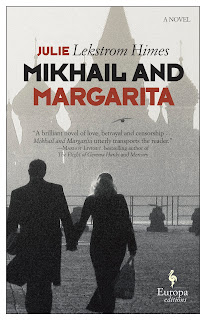I have had a long love affair with Russian literature and particularly Russian satire and Russian magical realism, a style of fiction that seems invariably tied to authoritarian political contexts in which they were written such as Tsarist Russia, the USSR, and much of Latin America. Over the years I have devoured books by Gogol, by Zamyatin, and by Bulgakov.
I first read Bulgakov’s magical realist novel Master and Margarita sometime in the 1970s while I was still a teenager. I was immediately hooked. Eventually I read everything by Bulgakov that I could get my hands on. Later I was lucky enough to be able to re-read most of Bulgakov’s works during the time I lived in Moscow. It was wonderful to be able to go to many of the places Bulgakov described in Master and Margarita including the Arbat, the Master’s house, Bulgakov’s flat, the Sparrow Hills, and the Patriarch’s Ponds.
Given my love of Bulgakov it was only a matter of time before I got around to reading Julie Lekstrom Himes’s love letter to Mikhail Bulgakov, Mikhail and Margarita (New York: Europa Editions, 2017). Mikhail and Margarita is a historical novel written by someone familiar with Russian and Soviet history and 1920s and 1930s Moscow. It is fictionalised tale that centres around an imaginary romance between Mikhail and the woman who had one been the lover of the Bulgakov’s friend, the famous Soviet poet Osip Mandelstam, Margarita. The relationship between Mikhail and Margarita is complicated by the fact thatan official in the USSR’s secret police is also in love with Margarita and is determined that she will be his.
Mikhail and Margarita has been sitting on my bookshelf for several years. I suspect I held off reading it because in the back of my mind I thought I would be disappointed by it. I should not have worried. I really enjoyed Himes’s book. Mikhail and Margarita, which weaves aspects of Bulgakov’s life and works into it, nicely transports readers back to Stalin’s Moscow and nicely gives readers sense of what is was like to live in one of history’s many police states.
One thing I didn’t like was a review of the novel I read after I finished the book. An anonymous reviewer for Kirkus, a noted short review magazine, found the book humourless—it is meant to be serious—found it lacking in the satire department—it was not meant to be a satire—and finds the characters uninteresting—something I wholeheartedly disagree with. Isn’t it a pity that so many normatively driven reviews who often seem to be lacking in the descriptive ability department take it upon themselves whinge and whine about the book they might have written rather than the book they are supposedly reviewing. Culture and ideology, on the march.

No comments:
Post a Comment